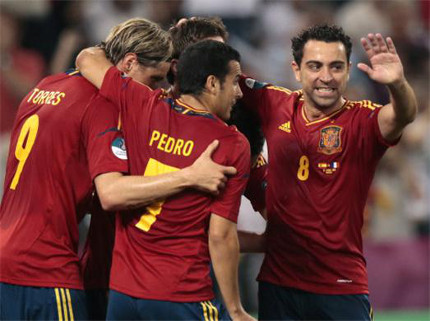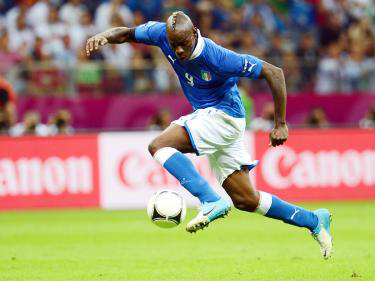So you’ve lost your taste for tiki-taka, have you?
Perhaps you should consider alternative plans for tomorrow when Spain defends its European football crown against Italy at the Olympic Stadium in Kiev, Ukraine.

Should Spain win, it will become the first nation to win three consecutive major trophies after the successes at the 2008 Euro and 2010 World Cup—although Spain finished third in the less heralded 2009 Confederations Cup that Brazil lifted in South Africa. The Spaniards will also match Germany’s record haul of three Euro titles.
But standing in the way is a familiar foe, Italy.
Boring Italy? Pretty but ineffective Spain?
Spain buried its stereotype at the last Euro, four years ago, and Italy has done the same in this edition. But that does not mean there are not strong and differing identities characterising either camp.
Manchester United boss Sir Alex Ferguson credited Italy with inventing the smokescreen and once said that, when promised pasta, he checks under the sauce to verify before he gets the fork out.
Yet, there is a transparency to Italy coach Cesare Prandelli’s team that seems at odds with a nation more famed for Machiavellian principles.
Mario Balotelli’s 15 shots on target represent more than a quarter of Italy’s goal attempts although the Manchester City striker was subbed in three of his four starts and was a late substitute in his other outing.

Midfielder Andrea Pirlo’s 354 completed passes is the fourth highest tally in the tournament; the Italian runner-up, Daniele De Rossi, tallied almost 80 passes fewer to come in at 16th.
A classic and explosive centre-forward well fed by a crafty playmaker? How quaint!
Spain will be under no illusions as to where Italy’s threat lies.
Perhaps, it is Prandelli’s use of a central schemer and old-fashioned striker—in an era of false number nines and wingers that cut inside to shoot rather than cross—that has touched emotional chords with neutrals in Euro 2012.
The Balotelli and Pirlo pairing draws easy comparisons with Gabriel Batistuta and Rui Costa, Alan Shearer and Paul Gascoigne or Rivaldo and Ronaldo in a bygone era.
Truth be told, Italy has been a breath of fresh air.
Prandelli insists that his players follow a strict disciplinary code but allows them to express themselves on the ball—an inverted José Mourinho if ever there was one. And, whereas lecherous ex-Italy Prime Minister Silvio Berlusconi had to be dragged from office, just a whiff of scandal prompted the immediate removal of talented left back Domenico Criscito from the Euro squad as Prandelli sought a healthy distance from yet another Italian match-fixing scandal.
The coach also kept faith with the dark-skinned 21-year-old Balotelli, who was born in Palermo to Ghanaian parents, when many were unconvinced or offended by the sight of him in an Italian jersey. Turns out one can be a black Italian after all.
The mercurial but gifted Balotelli represents Italy’s best chance of success granted Pirlo and the erratic but talented Antonio Cassano can locate him.

It is an intriguing triangle.
Pirlo was considered a spent force and discarded by Milan a year ago, Balotelli was declared unmanageable by Mourinho and, a few months ago, current coach Roberto Mancini vowed never to play him again. And, despite being just 29, Cassano, who underwent heart surgery last November, lacks the fingers to count the number of coaches and chairmen with whom he has fallen out.
But both Balotelli and Pirlo ended their domestic seasons as champions with Manchester City and Juventus respectively.
Italy almost did not show up for the Euros at all after Prime Minister Mario Monti threatened to suspended football for “two to three years” owing to the country’s recent scandal.
And Spain?
Sure, the Spaniards boast all three of the Euro’s best passers—Xavi, Xabi Alonso and Sergio Busquets respectively—have the tournament’s stingiest defence and, with eight goals from five matches, have already matched their goal tally from seven 2010 World Cup final outings.
But, well, is that all you can do, señores?

Brazil’s 1970 team is still the stuff of legends after fitting four “number 10s” into the first team; Spanish coach Vicente del Bosque is likely to have six playmakers in his XI and their ball retention is as beautiful as it is complex. Still, Spain suffered the ignominy of being whistled during the semi-final, which it won by penalties against Portugal.
Critics of Del Bosque’s reluctance to start a recognised centre-forward should concede that Spain has never been well served by “number 9s.”
True, Fernando Torres scored the winner in the 2008 Euro final against Germany. But it was only his second goal of the tournament.
The list of Torres’ competitive goals in the four years since that celebrated strike reads: a 2009 Confederations Cup hattrick against New Zealand, a double against Liechtenstein in a 2012 Euro qualifier and two more items in a Euro 2012 group fixture against Ireland.
Who can argue that Spain can’t get by without such an input?
The absent David Villa is listed as a striker but prefers diagonal runs from wide areas into the penalty box rather than wrestling for space from central defenders. In short, Spain does not get much purchase from playing a centre-forward; so why bother?
And then, there is the “tiki-taka” passing style itself. At first, many found it cute like an unusual giggle but now it apparently galls some neutrals.
Somehow, Spain’s refusal to give the ball back and to offer opponents a focal point in attack that can be promptly marked has been interpreted as a sort of cheating. They resent Del Bosque and his short-passing troops and want to see them get their come-uppance.

Much in the same way that tennis legend Pete Sampras’ serve and volley style grated, the cricket world cursed the ruthless efficiency of West Indies’ pace quartet in the 1980s and boxing fans yearned to see Muhammad Ali defeated.
If Spain, like the aforementioned sporting icons, can live with the grumbling and disparaging remarks; then a record third successive major crown is there for the taking.
Stuffed with serial winners on the pitch, bench and technical seats, Spain got nine of its 12 wins in the Euro 2008 and 2010 World Cup by a solitary goal—their four knock-out triumphs in South Africa were all by a 1-0 score. It is the sign of a team that knows what is required at the office; a squad that plays not to thrill but to triumph.
Italy came to Euro 2012 to put on a good showing and has done so. However, Prandelli has never lifted so much as a Serie A gong while, Pirlo and captain Gianluigi “Gigi” Buffon apart, the squad lacks a player who has shone in a European or FIFA tournament.
And, of course, it is worth noting Italian football’s curious relationship with match-fixing.
In 1982, striker Paolo Rossi returned from a ban to guide his nation to the World Cup title in Spain while, in 2006, the Italians shrugged off the Calciopoli scandal to historic effect.
Prandelli, whose Fiorentina team was also fingered in 2006, will aim to seal an unusual—and dubious—hattrick for Italy.
But don’t bet on it.
 Wired868 Wired868 for smart sport news and opinion
Wired868 Wired868 for smart sport news and opinion







